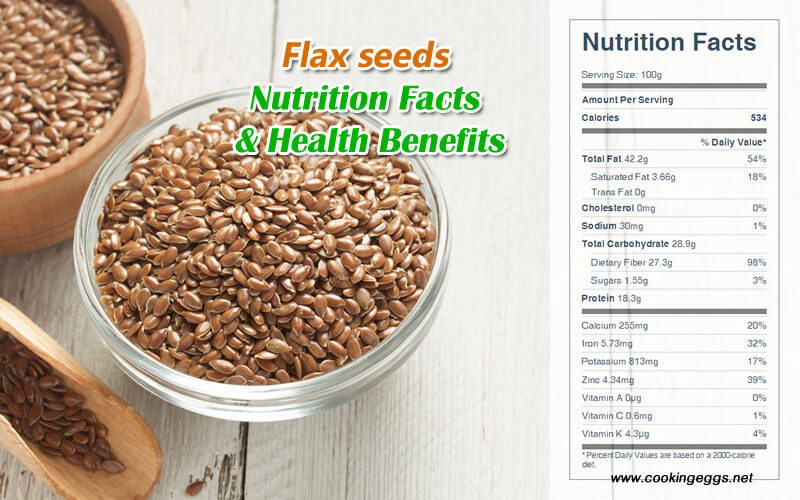Flax seeds Nutrition Facts & Health Benefits
Flax seed is sometimes known as linseed. It is high in fiber, omega-3 fatty acids, and lignans. Flaxseeds are also a powerful source of protein, magnesium, iron, zinc, and potassium. They are an all-around treasure trove of nutrients.
Flax seed is rich in omega-3 and omega-6 fatty acids, protein, and vitamins A and B. It contains more vitamin E by volume than any other known seed.

The nutritional value of flax seeds
Flax seeds are 7% water, 18% protein, 29% carbohydrates, and 42% fat. In 100 grams as a reference amount, flax seeds provide 534 kcal and contain high levels of protein, dietary fiber, several B vitamins, and dietary minerals. Flax seeds are especially rich in thiamine, magnesium, and phosphorus.
Two tablespoons of ground flaxseed provide 60 calories, 4 g carbohydrate, 3 g protein, 4.5 g fat, 4 g dietary fiber, 20 mg calcium, and 0.72 mg iron.
As a percentage of total fat, flax seeds contain 54% omega-3 fatty acids (mostly ALA), 18% omega-9 fatty acids (oleic acid), and 6% omega-6 fatty acids (linoleic acid); the seeds contain 9% saturated fat, including 5% as palmitic acid. Flax seed oil contains 53% 18:3 omega-3 fatty acids (mostly ALA) and 13% 18:2 omega-6 fatty acids.
Flax seeds Nutrition Facts Label
Health Benefits of Flaxseed
Flax has high omega-3 fatty acid and linolenic acid content, high dietary soluble and insoluble fibers, and a high content of lignans. Flaxseed contains 60% linolenic acid, which aids in cell wall integrity and inhibits the production of tumor-causing acids.
Flaxseed is rich in alpha-linolenic acid (ALA), an omega-3 fatty acid. The omega-3 content provides antiinflammatory benefits, and some research has suggested that for people who do not eat fish, flaxseed oil may provide a good alternative source of omega-3. Omega-3 fatty acids are used by the body to produce anti-inflammatory prostaglandins, and they may help reduce the inflammation that is a significant factor in conditions such as asthma, osteoarthritis, rheumatoid arthritis, migraine headaches, and osteoporosis.
Flaxseeds and sesame seeds contain high levels of lignans, which are phytoestrogens, or plant estrogens. The lignan content in flaxseed gets converted in the gut to enterodiol and enterolactone, which have estrogenic activity and antioxidant effects.
Lignans influence the balance of estrogens in the body, helping to protect against breast cancer. Studies have shown flax to reduce the growth of hormone-sensitive cancerous tumors (such as breast, endometrium, and prostate). Lignans can also help relieve some of the concerns of menopause, including hot flashes. Other foods containing lignans include cereals (rye, wheat, oat, and barley), soybeans, tofu, cruciferous vegetables, such as broccoli and cabbage, and some fruits, particularly apricots and strawberries.
Flaxseed is often recommended as a daily supplement to support bowel and skin health. The prebiotics in flax serve as food for the gut microbiome. A study of flaxseed found it altered the bacterial flora in the intestines of animals. It has been shown to increase Prevotella bacteria by twenty times and decrease Akkermansia by thirty times. Prevotella produces anti-inflammatory metabolites, which subsequently reduce TH17 cells and promote the differentiation of anti-inflammatory T regulatory cells in the gut. It has been found that decreased levels of Prevotella have been reported in diseases such as multiple sclerosis, autism, and type 1 diabetes.
A meta-analysis showed that consumption of more than 30 g of flax-seed daily for more than 12 weeks reduced body weight, body mass index (BMI), and waist circumference for people with a BMI greater than 27.
Another meta-analysis showed that consumption of flax seeds for more than 12 weeks produced small reductions in systolic blood pressure and diastolic blood pressure.
Flaxseed can help reduce total blood cholesterol and LDL levels and, as a result, may help reduce the risk of heart disease. The research shows that consuming flax seed or its derivatives may reduce total and LDL-cholesterol in the blood, with greater benefits in women and people with high cholesterol.
Tips: Recommend ground flax seed because it is easier for your body to digest. Whole seeds may pass through your system undigested.
Health Risk
Flax seed and its oil are generally recognized as safe for human consumption. Like many common foods, flax contains small amounts of cyanogenic glycoside, which is nontoxic when consumed in typical amounts but may be toxic when consumed in large quantities, as with staple foods such as cassava.
Flaxseed contains a small amount of prussic acid, which in very large amounts can be toxic. However, you'd have to eat enormous quantities of the seeds to be at risk from prussic acid toxicity. Do avoid eating immature, unripe flaxseeds, which may be toxic. Also, flaxseed oil turns rancid rapidly, faster than other seed and vegetable oils, especially when exposed to light, heat, or oxygen.